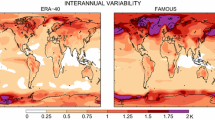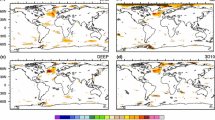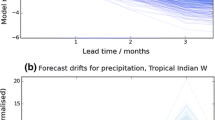Abstract.
Any initial value forecast of climate will be subject to errors originating from poorly known initial conditions, model imperfections, and by "chaos" in the sense that, even if the initial conditions were perfectly known, infinitesimal errors can amplify and spoil the forecast at some lead time. Here the latter source of error is examined using a "perfect model" approach whereby small perturbations are made to a coupled atmosphere–ocean general circulation model and the spread of nearby model trajectories, on time and space scales appropriate to seasonal-decadal climate variability, is measured to assess the lead time at which the error saturates. The study therefore represents an estimate of the upper limit of the predictability of climate (appropriate to the initial value problem) given a perfect model and near perfect knowledge of the initial conditions. It is found that, on average, surface air temperature anomalies are potentially predictable on seasonal to interannual time scales in the tropical regions and are potentially predictable on decadal time scales over the ocean in the North Atlantic. For mid-latitude surface air temperature anomalies over land, model trajectories rapidly diverge and there is little sign of any potential predictability on time scales greater than a season or so. For mean sea level pressure anomalies, there is potential predictability on seasonal time scales in the tropics, and for some global scale annual-decadal anomalies, although not those associated with the North Atlantic Oscillation. For precipitation, the only potential for predictability is for seasonal time anomalies associated with the El-Niño Southern Oscillation. For the majority of the highly populated regions of the world, climate predictability on interannual to decadal time scales based in the initial value approach is likely to be severely limited by chaotic error growth. It is found however that there can be cases in which the potential predictability can be higher than average indicating that there is perhaps some utility in making initial value forecasts of climate in those regions which show low predictability on average.
Similar content being viewed by others
Author information
Authors and Affiliations
Additional information
Electronic Publication
Rights and permissions
About this article
Cite this article
Collins, .M. Climate predictability on interannual to decadal time scales: the initial value problem. Climate Dynamics 19, 671–692 (2002). https://doi.org/10.1007/s00382-002-0254-8
Received:
Accepted:
Issue Date:
DOI: https://doi.org/10.1007/s00382-002-0254-8




